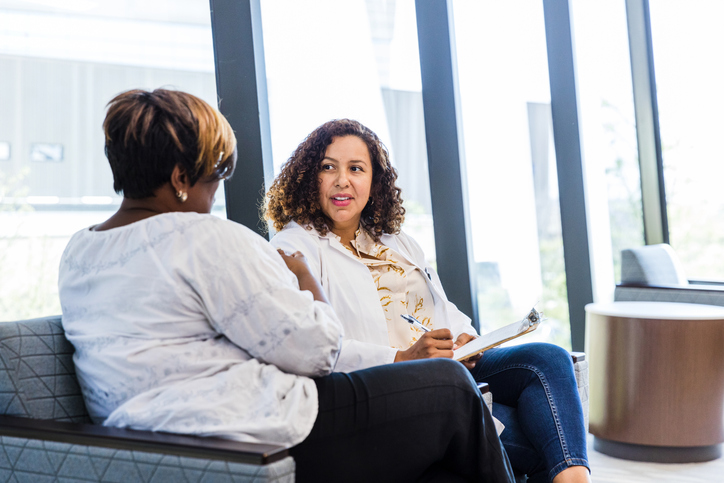
Source: RealPeopleGroup / Getty
I recently shared a message across social media that went viral with tens of thousands of shares on Twitter, Facebook and Instagram. And while I have experienced viral social media moments before, this moment hit different. All the shares saddened me, because it was a message too many women identified with or felt they needed to hear. And the fact that this message has been absent in so many women’s lives means that too many of us are not living up to our full potential which robs the world of our gifts, our true beauty and our joy.
It all started from a conversation I had with a former student who I now mentor. Mya is 25-years-old and is struggling a bit to find her footing in the world, and she asked me what advice I (at 45) I would give my 25-year-old self. It was an easy answer, because, if I’m honest, it’s a lesson that I’m just beginning to understand and practice. The advice? Quit. Quit early and often.
All of us humans are socialized to believe that quitters never win—that in order to gain success in life we must give every single pursuit our all, no matter what giving our all may cost us. Women, particularly, are taught to over invest in every kind of relationship—work relationships, romantic relationships, familial relationships, you name it.
We are taught to pour and pour and pour, until we are empty and to never expect too much in return. This is what nurturers do, yes? We work to build others up—and not just in our roles as literal mothers. We are expected to always mother and to mother everything and everyone. And anytime we push back against this expectation, when we say no or when we dare to choose ourselves, we are shamed as being selfish and unloving. Women are programed—through media and through modeling— to lean towards selflessness and self-abandonment.
So many of us watched the women we love refuse to quit. We watched them stay at jobs they hated. We watched them stay in romantic relationships where they felt unfulfilled or even ones where they experienced abuse. We watched them stay connected to demeaning and harmful familial situations. And what this staying taught us is to put the needs of everyone else before our own, and to stay hopeful and committed to people, places and things long after our minds, hearts and bodies tell us we should go. Watching the women in our lives stay too long instructs us to not trust our intuition—to ignore the voice inside of us that screams “this ain’t it,” to turn off the signals from our brain and nervous system that make us feel anxious, sad, and angry when it’s time for us to pack up and head out.

Source: Milko / Getty
Speaking of packing up and heading out, many of the women who shared my message about quitting online struggle to understand how they can figure out when to leave. The answer to this question is complicated and can vary by situation, but a sure way to begin the process of trusting ourselves to make the best decisions for us is to work to develop a stronger sense of self. Our sense of self is connected to our lived experiences, and often the things we experience in childhood. If we had a childhood where we were not affirmed, where we experienced abuse, abandonment, and/or neglect, we might struggle to understand who we really are and what we really want. We can also battle to develop a strong sense of self when we are coddled and not allowed to be autonomous and independent as children—when we are not taught that we can decided, for ourselves, what we want and need. Our sense of self is our internal compass; it sits at the root of our intuition, and it guides us in our interactions with others. So, it makes sense that we struggle to quit situations that don’t serve us if our sense of self isn’t solid.
Quitting also requires women, particularly, to push back against the ways we are socialized to people please and self-abandon. This means women must build the tools they need to find and use their no, and must even become more comfortable with questioning why we say yes (often) too much. The answer to our yeses and our noes requires that we lean into self-inquiry and curiosity– asking ourselves, did I say yes to this person or thing because I really want to or because I feel some kind of obligation. Even at my big age, I have to pause before I respond to requests to ask myself, “What do you really want/need in this moment?” Once we can answer these kinds of questions honestly, we can then move on to evaluate our relationships more deeply.
When evaluating whether we should continue at our jobs we should ask ourselves, “Do I feel welcomed and valued in this space?” Does this space compensate me well for my time and physical/mental/emotional energy?” “Does this feel like an experience rooted in reciprocity?” And as the great bell hooks encourages us to consider in her book All About Love, “Do I feel love here?”
When we wonder whether our romantic relationships are worth continuing, we should ask, “Do I feel loved, respected and valued in this relationship?” “Have I simply outgrown this?” “Are both myself and my partner willing to do the work to repair what feels broken here?” “Am I investing too much, too soon?” “Are there red flags I’m ignoring for the sake of maintaining relationship?” Most importantly, “Do I have limiting beliefs that tell me that I should choose relationships that are undesired or unhealthy because I desire to be seen as coupled and, thus, valuable.”

Source: SDI Productions / Getty
The questions above, of course, are only a starting point when deciding whether we should quit something or someone. The real work, many times, is the work of figuring out why making decisions about whether we should stay or go are so difficult, and the work of uncovering why we don’t trust ourselves more deeply and why we don’t have clearer and higher standards for our lives. I found those answers through finding a therapist who helps me dig into past traumas and who helps me build tools that can change the ways I think and move through life. Whatever way towards freedom you choose, I hope we all learn to say no to the people and places that don’t serve us, so that we can make more room to say yes to all the people and places that will.
Josie Pickens is an educator, organizer, and writer based in Houston, Texas. Follow her on Twitter and Instagram at @jonubian.










